
Kenya’s minister for tourism and wildlife recently announced that the country will fast track a law to make the illegal hunting of wildlife a capital offense punishable by the death penalty.
The statement has attracted a great deal of attention. So has the unclear position taken by The Convention on International Trade in Endangered Species of Wild Fauna and Flora, CITES, a respected authority on the trade in biodiversity.
On May 11th, CITES re-tweeted a news article about Kenya’s proposed use of the death penalty:

Should the death penalty be considered as part of legitimate “action” for biodiversity?
CITES attached the hashtag #SeriousAboutWildlifeCrime to the tweet.
Critics argue that by doing so the world body was endorsing Kenya’s policy. The hashtag was created three years ago by the United Nations Office on Drugs and Crime for the World Wildlife Day campaign “it’s time to get serious about wildlife crime”. It was meant to be used as a call to raise awareness about wildlife crime and “highlight the critical need to step-up efforts in tackling the groups involved.”
Attaching the hashtag to the tweet could therefore send the message that CITES endorses the use of the death penalty in tackling wildlife crime.
Some people have come out in defence of CITES arguing that re-tweeting the article can’t be taken as an endorsement of Kenya’s policy.
I disagree. Attaching the hashtag, along with the hashtag #WildlifeLaw, to the news story sends the message that the death penalty is a legitimate way to be serious about wildlife crime.
CITES could have – and I would argue should have – taken a different approach. It could have re-tweeted the story with a comment that this isn’t an appropriate way to tackle wildlife crime. Or, at a minimum, it could have remained neutral. It did neither, nor has it clarified its position despite multiple requests to do so on its Twitter feed.
As a global authority on protecting biodiversity CITES’s position matters. It’s ambiguous stance is worrying because how poaching is tackled is a hugely divisive issue with growing calls for countries to move beyond an enforcement focused approach.
Leading conservationists have warned for some time that violent approaches to wildlife trafficking are not “politically feasible” and that killing poachers risks aggravating already poor relations between people living in and around protected areas.
Most importantly, killing those who hunt illegally fails to address socio-economic injustices or the demand for wildlife products.
Why the death penalty won’t work
Kenya takes wildlife crime seriously, at least on paper. The country has had life sentences for the illegal killing of endangered or threatened species since 2013 under its Wildlife Conservation and Management Act.
But, according to Kenya’s minister for tourism and wildlife, the punishment of life in prison
has not been a deterrence enough to curb poaching.
Kenya does have the death penalty for other crimes. But in 2009 the country commuted all existing death sentences to sentences of life imprisonment. It repeated the process in 2016, effectively putting a halt to the death penalty. Why should the death penalty for killing wildlife now supersede these steps? And if the prospect of life in prison is not a deterrent to illegal hunting, how much of a deterrent will the death penalty be?
Capital punishment has failed to be a deterrent to crime in other contexts. In addition, CITES’ stance is material because its secretariat is administered by the United Nations Environment Programme and the vast majority of its signatories are party to the UN.
The UN’s position on the death penalty is very clear: it wants it abolished. As recently as October 10th, 2017, the United Nations Secretary General stated that “The death penalty has no place in the 21st century”. He described it as a barbaric practice” and “a very urgent and troubling human rights issue” adding that it “does little to service victims or deter crime.”
Between 2007 and 2013, the UN General Assembly passed five resolutions urging states to
progressively restrict its use and reduce the number of offences which are punishable by death.
This suggests that CITES has a role to play in abolishing the death penalty, not endorsing it. But does it?
CITES is an international regulatory regime signed by 183 member parties to regulate the trade (import, export, re-export, and introduction) of species of flora and fauna covered by the convention. Its stated aim is “to ensure that international trade in specimens of wild animals and plants does not threaten their survival.”
The problem is that the proposed legislation by the Kenyan government is not about the import, export, re-export, and introduction of trade in wild animals. It is a national policy to more severely punish the illegal hunting of wildlife. Is it an over reach for CITES to be commenting at all?
Question mark over CITES
CITES’ re-tweet about Kenya’s death penalty struck a nerve because it appears to be part of a pattern in its social media postings that increasingly seem to support heavy handed and controversial approaches to anti-poaching.
On May 14th, for example, CITES tweeted what some saw as an endorsement of militarised conservation:

Militarised conservation refers to a trend in managing poaching that relies on military personnel, training and technologies as well as counter-insurgency techniques.
Academics and conservationists have put forward multiple reasons why militarised conservation doesn’t work. At the heart of their argument is the potential for human rights abuses and the fact that people with guns don’t deliver long term solutions.
![]() As the world celebrates 25 Years of Action for Biodiversity on May 22, efforts to advance the progress that’s already been made would be given a significant boost if the world organisation that spearheads many of these efforts made it clear where it stood on two big issues of the day: the death penalty for poachers, and the use of the military in combating poaching.
As the world celebrates 25 Years of Action for Biodiversity on May 22, efforts to advance the progress that’s already been made would be given a significant boost if the world organisation that spearheads many of these efforts made it clear where it stood on two big issues of the day: the death penalty for poachers, and the use of the military in combating poaching.
Francis Massé, Postdoctoral research fellow, University of Sheffield


